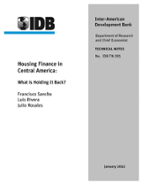Housing Finance in Central America: What is Holding It Back?
Date
Jan 2012
This paper surveys housing finance in Costa Rica, El Salvador and Panama. The development of a secondary mortgage-backed securities market in Costa Rica is very limited despite a broad legal framework, while in El Salvador it is nonexistent and in Panama has not grown due to high liquidity. In Costa Rica's subsidy policy, core institutions responsible for housing policy act as facilitators of private agents. This contrasts with the dispersion of policy and institutional efforts identified in Panama and El Salvador. Government subsidies are especially directed to households where more of 90 percent of the housing deficit is concentrated. A solution based on public budgets is not sustainable, requiring an active role of the private housing finance sector. Increasing the purchase capacity of families and reducing the cost of financing are necessary conditions to reduce housing deficits.



